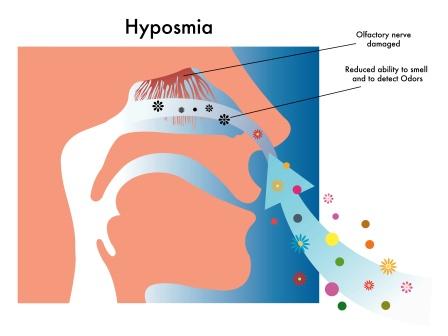Anosmia: Ayurvedic Treatment And Home Remedies
Article by Prof. MS Krishnamurthy MD(Ayu), PhD
Anosmia means loss of sense of smell. It is usually caused by nasal condition and rarely by brain injury. Very few people are born without the sense of smell and it is called as congenital anosmia. Hyposmia is another related condition with decreased power to sense smell.

Table of Contents
Causes
Common causes for Anosmia:
Mild to moderate kind of anosmia may be caused due to cold, rhinitis, head ache, stress etc
This is caused due to inflammation of the nasal mucosa, blockage of nasal passages or a destruction of temporal lobe.
Complete anosmia is found due to injury to the nostrils or long persisting bleeding from the nose, influence of acids or any chemical agents etc.
It is commonly found due to chronic meningitis and neurosyphilis , ciliopathy and primary ciliary dyskinesia.
It may be rarely found Parkinson’s disease and Alzheimer’s disease too.
Anosmia is usually bilateral and in few of the cases unilateral too.
Common disorders
Common disorders possessing the feature/symptoms of Anosmia:
Upper respiratory tract infection (sinusitis or the common cold)
Nasal polyps
Hypothyroidism
Head trauma, damage to the ethmoid bone
Specific antibiotics
Fibromyalgia
Multiple sclerosis
Hypoglycaemia
Epilepsy
Radiation therapy to the head and neck
Smoking
Schizophrenia
Pernicious anemia
Chronic obstructive pulmonary disease (COPD)
Cushing’s syndrome
Stroke
Bell’s Palsy
Paget’s disease of bone
Zinc deficiency
Asthma or Allergy
Cerebral aneurysm etc
Ayurvedic understanding
Ayurvedic understanding about Anosmia:
Ayurveda refers this condition as Ghrana nasha.Ghrana mens smell and nasha refers loss.This is a Vatic complaint caused due to the lodgement of the vitiated vata dosha in the site of
Ghrana (nostrils), Ruksha(dryness), laghu(lightness), Khara(roughness) qualities of Vata is aggravated due to Vatic food and habits and it leads to the lodgement of vata in its site of action i.e nostrils.Thus the ability of vata is lost and hence anosmia (gandhanasha) occurs.
Line of treatment
Line of treatment of Anosmia (Gandhanasha):
Vatahara remedies are useful for both local and systemic effect. Mild, unctuous, heavy and soft medicaments are of choice in this context.
Nasya treatment – Nasal drops treatment with Anu Taila and Shadbindu taila is very useful in case of Vata Dosha increase.
Dhoomapana – herbal smoking is useful in Kapha Dosha increase, leading to excess phlegm collection.
Vamana – vomiting therapy is useful in excess of Kapha Dosha increase.
Useful herbs
Herbal drugs of priority in Anosmia (Gandhanasha):
Paribhadra-Erythrinia variegata
Bala-Sida cardifolia
Bilva-Aegle marmelos
Shyonaka-Oroxylum indicum
Pippali-Long pepper-Piper longum
Guggulu-Balsmodendron mukul
Sarjarasa-Shorea robusta
Twak and Patra- Syzizium aromaticum etc
Ayurvedic formulations
Formulations useful in Anosmia (Gandhanasha):
Vatavidhwamsa rasa
Laxminarayana rasa
Balarishtha
Mahayogaraja guggulu
Ashwagandhavalehya
Tenginpookuladi rasayana
Saptasara kashaya
Shadbindu taila (For nasya)
Anutaila (For nasya)
Do’s and Dont’s
Dos and Donts in Anosmia (Gandhanasha):
Pranayama, Kapalabhati, breathing exercises, rest, regular oil application to the scalp are very essential in Anosmia.
Taking the smell of strong perfumes, exposure to the dust and fumes, pollens, towards the substances regarding which person is allergic are to be avoided in anosmia. Repeated infections are to be reduced. Cold water head bath, exposure to breeze etc are to be avoided.
Last drop,
Every individual is eager to have the taste, smell, touch, listen and to see the objects of his liking. If the individual looses the ability of perceiving any one of these senses will surely disgusted regarding such an ill health condition.
Unless structural deformity is found Ayurveda proves its efficacy in correcting this functional entity to its maximum extent.
As allopathic medicines do not have any significant drug to treat such a condition quite effective treatments are always in search. That is why we say-‘Age old Ayurveda begins where so called Advanced Modern systems end !. It is funny but the ultimate truth.
Article by Prof. MS Krishnamurthy MD(Ayu), PhD









One comment
Harika
wow sir… Amazing explation Thankyou